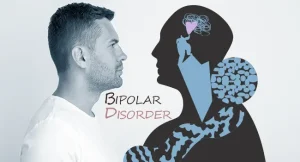Bipolar Disorder

Bipolar disorder, formerly known as manic-depressive disease, is a mental illness marked by intense emotional fluctuations, including sadness and manic or hypomanic highs. A person's energy, activity level, judgment, conduct, and capacity for clear thought can all be impacted by these mood changes.
Here are some essential details regarding bipolar disorder:
Types:
There are several forms of bipolar disorder, and each is distinguished by particular mood episode patterns. The primary varieties of bipolar disorder consist of:
- Bipolar I Disorder: Manic episodes of this sort must endure for at least seven days or be severe enough to necessitate emergency hospital treatment. Moreover, depressive episodes usually happen and linger for at least two weeks. Some people may go through mixed episodes, in which they vary quickly between manic and depressed symptoms or occur concurrently.
- Bipolar II Disorder: Individuals with this form of disorder undergo hypomanic and depressed periods, which are milder than the full-blown manic episodes associated with Bipolar I Disorder. Hypomanic episodes are characterized by an elevated mood and higher energy levels, but they do not necessitate hospitalization or cause a severe impairment in functioning.
- Cyclothymic Disorder (Cyclothymia): Multiple periods of hypomanic symptoms and multiple periods of depressed symptoms, lasting at least two years (one year in children and adolescents), are characteristics of cyclothymia. The symptoms, however, do not fit the description of a manic, hypomanic, or severe depressive episode.
- Other Specified and Unspecified Bipolar and Related Disorders: Symptoms of bipolar illness that do not cleanly fit into pre-existing diagnostic categories or do not meet the requirements for the kinds mentioned above fall under this category. It might include diseases like rapid cycling bipolar illness, which causes a person to go through four or more mood swings in a year. Mental health practitioners frequently utilize the Diagnostic and Statistical Manual of Mental Disorders (DSM-5) to diagnose psychiatric disorders, and it has definitions for these categories. Determining the precise kind of bipolar illness is essential to creating a treatment plan that is suitable for the patient.
Symptoms:
 Depending on the kind of episode (manic, hypomanic, or depressed) and the severity of the illness, bipolar disorder symptoms can differ greatly. The following are the common symptoms linked to each kind of episode:
01. Manic Episode:
Depending on the kind of episode (manic, hypomanic, or depressed) and the severity of the illness, bipolar disorder symptoms can differ greatly. The following are the common symptoms linked to each kind of episode:
01. Manic Episode:
- Elevated or irritable mood: experiencing extreme happiness, euphoria, or agitation.
- Increased energy and activity: being incredibly gregarious, agitated, or unable to remain still.
- Racing thoughts: Thinking quickly, hopping from one concept to another, or experiencing a rushing mind.
- Reduced need for sleep: either not experiencing the need for sleep at all, or feeling refreshed after getting very little sleep.
- Grandiosity: exaggerating one's feeling of self-worth or confidence in one's skills or talents.
- Increased talkativeness: Speaking too quickly or too loudly.
- Impulsivity: taking part in dangerous activities, such careless driving, drug usage, or extravagant spending.
- Poor judgment: making choices that are uncharacteristic or have unfavorable effects.
- Psychosis: Having hallucinations (seeing or hearing things that aren't there) or delusions (wrong beliefs).
2. Hypomanic Episode:
- symptoms that resemble manic episodes but are less severe, may not necessitate hospitalization, and may not significantly impede functioning.
- Although hypomanic episodes are usually not as severe as manic episodes, they can nonetheless cause increased energy, high mood, racing thoughts, and increased activity levels.
03. Depressive Episode:
- Persistent sad, anxious, or empty mood: feeling depressed, useless, or without hope.
- Loss of interest or pleasure in activities once enjoyed: losing interest in relationships, social interactions, or hobbies.
- Changes in appetite or weight: Significant changes in appetite or weight gain or decrease.
- Sleep disturbances: difficulty obtaining or maintaining sleep, or excessive sleeping.
- Fatigue or loss of energy: feeling worn out, lethargic, or physically exhausted.
- Feelings of worthlessness or guilt: feeling unworthy, guilty, or taking responsibility for events outside of one's control.
- Difficulty concentrating or making decisions: difficulty remembering, concentrating, or making choices.
- Thoughts of death or suicide: Considering suicide or death, or making attempts at suicide.
Causes:
 Although the precise origin of bipolar disease is unknown, a mix of biochemical, genetic, and environmental variables are thought to be involved. The following are some variables that might lead to the onset of bipolar disorder:
Although the precise origin of bipolar disease is unknown, a mix of biochemical, genetic, and environmental variables are thought to be involved. The following are some variables that might lead to the onset of bipolar disorder:
01. Genetic Factors: Given that bipolar illness tends to run in families, genetics may have a major influence in the condition's development. The likelihood of having bipolar disorder is increased if one has a family member who has the illness. It's crucial to remember that not everyone with a family history of bipolar disorder will experience the illness; this suggests that other variables may also play a role in the disorder's genesis.
02. Biological Factors: Bipolar disorder is linked to a number of biological variables, including:
- Neurotransmitter Imbalance: Dopamine, serotonin, and norepinephrine imbalances are among the neurotransmitters that may be partially responsible for the mood swings associated with bipolar illness.
- Structural and Functional Brain Abnormalities: Studies on brain imaging have revealed structural and functional variations in certain brain areas related to mood regulation in bipolar disorder sufferers.
- Hormonal Imbalance: In those who are predisposed to bipolar illness, hormonal changes, such as those that happen during puberty, pregnancy, or menopause, may cause or worsen mood episodes.
03. Environmental Factors: Bipolar illness risk may be elevated by the interaction of environmental, genetic, and biological variables. These elements might consist of:
- Stressful Life Events: For those who are vulnerable, traumatic experiences, significant life transitions, or ongoing pressures may set off mood episodes.
- Substance Abuse: Abuse of substances, especially alcohol, cocaine, or amphetamines, can exacerbate bipolar disorder symptoms and cause manic or depressed episodes.
- Disrupted Circadian Rhythms: Mood instability in bipolar disorder patients may be exacerbated by irregular sleep patterns or disturbances in circadian rhythms, the body's internal clock.
04. Other Risk Factors: A number of variables might raise the chance of getting bipolar illness or making its symptoms worse, such as:
- Childhood Trauma: Bipolar disorder risk may be elevated in later life by adverse childhood events, such as abuse, neglect, or loss.
- Medical Conditions: Bipolar disorder may be more likely in those who have certain medical illnesses, such as neurological or thyroid issues.
- Medications: Certain drugs, such corticosteroids or antidepressants, have the potential to cause manic or hypomanic episodes in those who are vulnerable.
It's critical to understand that each person's experience with bipolar illness is unique and that the condition is complicated and multifaceted. There is constant research being done to better understand the basic factors behind bipolar illness and to find effective therapies.
Treatment:
 Typically, medication, psychotherapy, lifestyle changes, and self-management techniques are used to treat bipolar disorder. Stabilizing mood, lowering the frequency and intensity of mood episodes, and enhancing general quality of life are the objectives of therapy. The following are the key elements of bipolar disorder treatment:
Typically, medication, psychotherapy, lifestyle changes, and self-management techniques are used to treat bipolar disorder. Stabilizing mood, lowering the frequency and intensity of mood episodes, and enhancing general quality of life are the objectives of therapy. The following are the key elements of bipolar disorder treatment:
01. Medication:
- Mood Stabilizers: The mainstay of bipolar disorder therapy, these drugs assist in regulating manic and depressed symptoms. Lithium, valproate (Depakote), and lamotrigine (Lamictal) are common mood stabilizers.
- Antipsychotic Medications: Atypical antipsychotics can be applied to treat mixed or acute manic episodes. Certain antipsychotics, such quetiapine (Seroquel) and aripiprazole (Abilify), may also have mood-stabilizing effects.
- Antidepressants: Mood stabilizers and antidepressants are occasionally used together to treat depression symptoms. They are usually taken with caution, though, so as not to set off manic episodes.
- Other Medications: As supplemental therapies, doctors may occasionally prescribe additional drugs such benzodiazepines for anxiety or sleep disorders or thyroid medicines for irregularities in the thyroid.
02. Psychotherapy:
- Cognitive-Behavioral Therapy (CBT): CBT can assist people in recognizing and altering the harmful thinking patterns and behaviors linked to bipolar illness. It could also aid in the development of coping mechanisms for stress and mood swings.
- Psychoeducation: Acquiring knowledge about bipolar disorder, its indications, causes, and available therapies can enable sufferers and their loved ones to more effectively handle the illness.
- Interpersonal and Social Rhythm Therapy (IPSRT): In order to assist regulate mood and avoid relapses, IPSRT focuses on stabilizing daily routines and interpersonal connections.
03. Lifestyle Modifications:
- Regular Exercise: Frequent physical activity can enhance wellbeing overall, lower stress levels, and enhance mood.
- Healthy Diet: Consuming a diet rich in fruits, vegetables, whole grains, lean meats, and balance may help to regulate mood and promote mental wellness.
- Adequate Sleep: Good sleep hygiene and sticking to a regular sleep pattern can help control mood and lower the likelihood of mood episodes.
- Stress Management: Acquiring skills in stress-reduction methods including deep breathing, mindfulness meditation, and relaxation exercises can aid in stress management and the avoidance of mood disorders.
04. Self-Management Strategies:
- Monitoring Mood: Individuals and their healthcare providers can evaluate progress and make necessary treatment adjustments by utilizing mood charts or apps to keep track of mood symptoms, triggers, and drug adherence.
- Avoiding Triggers: Mood episodes can be avoided by recognizing and avoiding triggers such substance misuse, sleep deprivation, and stressful events.
- Seeking Support: Establishing a solid support system with family, friends, and mental health specialists may help during trying times by offering support, understanding, and encouragement.
05. Regular Monitoring and Follow-Up: It's critical to schedule routine check-ins with healthcare professionals in order to assess treatment efficacy, control side effects, and make any therapy adjustments. Maintaining open lines of contact with medical professionals can help guarantee that patients receive comprehensive treatment catered to their unique requirements.
People with bipolar illness must collaborate closely with their medical team to create a customized treatment plan that takes into account their particular symptoms, preferences, and objectives. Many persons with bipolar illness are able to effectively control their symptoms and have happy lives when they receive the right therapy and support.
Management:
 A multifaceted strategy involving medication, psychotherapy, lifestyle changes, and self-care techniques is necessary to manage bipolar illness. The following is a summary of successful management techniques:
A multifaceted strategy involving medication, psychotherapy, lifestyle changes, and self-care techniques is necessary to manage bipolar illness. The following is a summary of successful management techniques:
01. Medication Management:
- As instructed by your healthcare practitioner, take prescribed drugs on a regular basis.
- Monitor any adverse effects and let your doctor know about them.
- Keep up with routine follow-up consultations to assess the efficacy of your medicine and make any required modifications.
02. Psychotherapy:
- Attend psychotherapy, such as cognitive-behavioral therapy (CBT), to control mood symptoms, identify triggers, and create coping mechanisms.
- To regulate daily routines and enhance interpersonal connections, take into consideration alternative kinds of treatment such as interpersonal and social rhythm therapy (IPSRT).
03. Lifestyle Modifications:
- Keep a regular sleep pattern by aiming for 7-9 hours of sleep every night and going to bed and waking up at the same time every day.
- Consume a diet high in fruits, vegetables, whole grains, and lean proteins in order to maintain good mental and physical health.
- Regular exercise, such running, yoga, swimming, or walking, can help lower stress and regulate mood.
- Reduce alcohol and caffeine consumption as these substances might cause mood swings and interfere with sleep cycles.
- Engage in stress-reduction activities, such as progressive muscle relaxation, deep breathing exercises, or mindfulness meditation.
04. Self-Care Strategies:
- Acquire the ability to spot mood episode precursors and create a strategy for dealing with them.
- Create a solid support system consisting of loved ones, close friends, and mental health specialists who can offer aid, understanding, and encouragement.
- To prevent being overwhelmed, prioritize your work and set reasonable goals.
- Develop healthy self-care routines, such as taking breaks when necessary, pursuing hobbies, and looking for enjoyable and relaxing activities.
- To better comprehend and control your symptoms, educate yourself on bipolar illness and be educated about your condition.
05. Avoid Triggers:
- Determine the triggers—such as stress, sleep deprivation, substance addiction, or significant life changes—that might make mood problems worse.
- Create plans to reduce exposure to triggers and learn how to deal with them when they do arise.
- Surround yourself with individuals who are aware of your disease and who can help you through trying moments to create a supportive atmosphere.
06. Regular Monitoring and Follow-Up:
- Use mood charts or apps to record your mood symptoms, medication adherence, and any changes to your health.
- Keep up with routine follow-up meetings with your physician to address any problems, assess your progress, and modify your treatment plan as necessary.
- By using these management techniques to your day-to-day activities, you can enhance your general wellbeing and effectively manage bipolar illness. Keep in mind that managing bipolar illness is a continuous process, and it's critical to collaborate closely with your medical team to choose the best course of action for you.
Prognosis:
 The intensity of symptoms, the patient's reaction to therapy, the existence of other physical or mental health issues, and the presence of a robust support network are among the variables that affect each person's prognosis for bipolar disorder. The following are important details about bipolar disorder prognosis:
The intensity of symptoms, the patient's reaction to therapy, the existence of other physical or mental health issues, and the presence of a robust support network are among the variables that affect each person's prognosis for bipolar disorder. The following are important details about bipolar disorder prognosis:
- Treatment Response: Many people with bipolar illness are able to effectively control their symptoms and lead productive lives when they receive the right therapy. It may take some time to determine the best mix of medicine, psychotherapy, and lifestyle changes, and some patients may need constant alterations to their treatment regimen.
- Stability: Stabilizing mood and functionality is a major objective of bipolar illness therapy. This might be lessening the influence of symptoms on relationships, employment, and general quality of life, as well as preventing or lessening the frequency and intensity of mood episodes and enhancing day-to-day functioning.
- Relapse Prevention: Although some people with bipolar disease may go through periods of remission during which they have few or no symptoms, recurrent mood episodes are characteristic of bipolar disorder. Relapse prevention techniques include sticking to a treatment plan, keeping an eye on mood symptoms, and figuring out what triggers you. These techniques can help lower your chance of relapsing and increase long-term stability.
- Co-occurring Conditions: Medical comorbidities, substance use disorders, anxiety disorders, and other mental or medical illnesses are common in people with bipolar disorder. A comprehensive treatment approach that addresses these co-occurring disorders can enhance overall prognosis and quality of life.
- Functioning and Quality of Life: Many people with bipolar illness are able to lead satisfying lives and make substantial recovery despite the difficulties that come with the condition. Nonetheless, the illness may still significantly affect functioning and quality of life, especially at times of severe mood instability or when symptoms are not well managed.
- Suicide Risk: Compared to the general population, those with bipolar illness have a higher risk of suicide, especially during depressed periods or mixed states. In order to lower the risk of suicide and increase safety, suicide prevention initiatives—such as early warning sign detection, mental health resource accessibility, and supportive interventions—are crucial.
Overall, even though bipolar disorder can be a difficult and chronic disease, many people with the illness are able to effectively manage their symptoms and attain stability and well-being over the long term with the right care and support. It's critical that people with bipolar illness collaborate closely with their medical professionals to create a customized treatment plan that takes into account their unique requirements and objectives. A good prognosis is largely dependent on proactive symptom management, continuous care, and routine monitoring.
